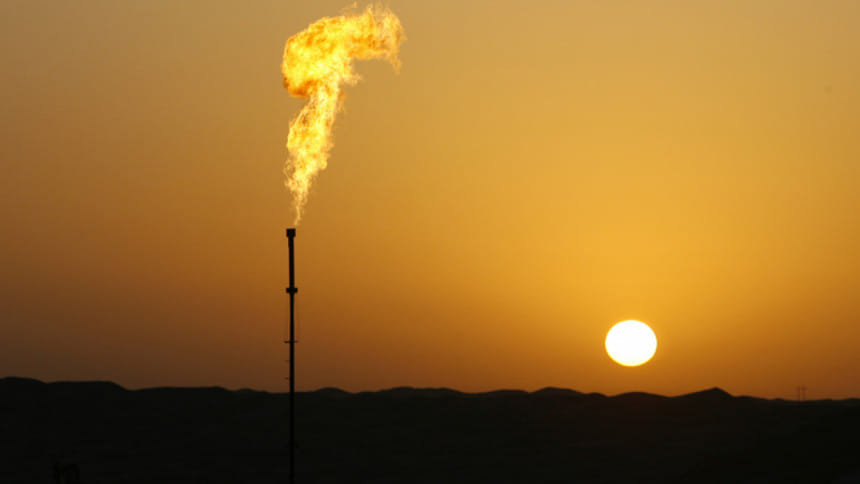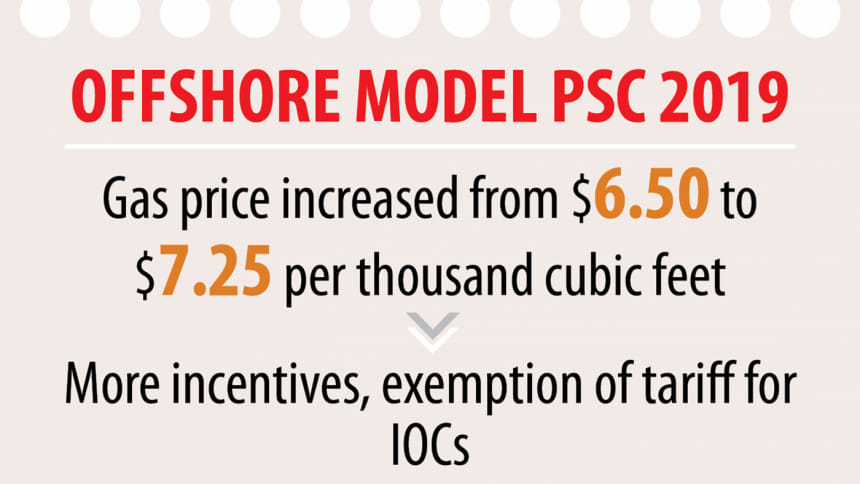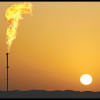IOCs can now export gas

International oil companies will now be able to export gas explored from Bangladesh’s offshore blocks in the Bay.
The government has reintroduced the provision for export of gas by the drilling companies in the Offshore Model PSC 2019. This will not be applicable for onshore blocks.

Bangladesh has 26 blocks in the Bay. Contracts for 22 of them have not been awarded yet.
Besides, it has also decided to provide the international companies with more incentives like increase of gas price, exemption of tariff and mandatory drilling option in the Offshore Model PSC that the cabinet committee on economic affairs approved recently.
The government had earlier included the export provision in the production sharing contract (PSC) in 2008 but amid criticism it was discarded in the 2012 version.
The country failed to lure expected number of international companies during the bidding round in 2012 owing to absence of the export provision and inadequate fiscal incentives, prompting the government to backtrack on this, according to energy experts.
This time the government has framed two PSCs -- Onshore Model PSC 2019 and Offshore Model PSC 2019.
The Onshore Model PSC 2019 that governs the blocks onshore will still bar gas export and won’t provide other incentives that are offered for shallow water and deep-sea blocks under the Offshore Model PSC 2019.
The ceiling price of gas has been revised up to $215 per tonne from $200 for offshore blocks. The floor price is $100. For onshore blocks, the floor price has remained $100 per tonne and the ceiling $200, according to a government document.
The price of gas, in terms of per thousand cubic feet, has been increased from $6.50 to $7.25. But the annual increase of the price has been brought down to 1.5 percent from 2 percent previously, said a senior official of Petrobangla.
Other major changes include removal of the mandatory drilling obligation in case of shallow sea blocks and deep-sea blocks and contractors have been exempted from paying 1 percent tariff for transmission service as they will already pay 4 percent of their share to cover tariffs and losses, he added.
Because of the price hike, the contractor would be able to recoup investment quickly but in the long-run the country does not lose much, observed the Petrobangla official.
On July 29, Nasrul Hamid, state minister for power and energy, in a statement said the exploration activities will accelerate if the PSCs are approved.
Another document says the new PSCs are investment-friendly, time-befitting and protect the country’s interest, and if approved, the contracts would create opportunities to explore oil and gas onshore and offshore in a bigger way.
M Tamim, a professor of petroleum and mineral resources engineering at Bangladesh University of Engineering and Technology, endorsed the new PSCs.
“Definitely, the country should be able to attract more interested bidders because the new Model PSC is relatively rational. The PSC protects both the country’s interest and that of international companies.”
He said it is okay that the country is going to offer a little bit higher prices for offshore gas because the investment in the deep sea is high and the use of technology is extensive and risks are more.
“I don’t think that the country’s interest has been thrown away by keeping the export provision. I think there is enough protection for Bangladesh’s interest,” the energy expert said, after analysing the terms and conditions.
Of the 26 blocks in the Bay, 15 are deep-sea blocks and 11 are in shallow waters. Currently, IOCs are active in four blocks. So, when the new bidding is called, the rest 22 blocks will be up for grab, said the Petrobangla official.
ONGC Videsh Ltd and Oil India Ltd are jointly exploring shallow water blocks SS-04 and SS-09, contracts for which were awarded in 2014. The joint venture of Santos and Kris Energy is exploring shallow water block SS-11, contract for which was awarded in the same year.
With the contract awarded in 2017, POSCO Daewoo Corporation of South Korea is exploring in deep water block DS-12.
EXPORT MOVE ‘NOT LOGICAL’
The National Committee to Protect Oil, Gas, Mineral Resources, Power and Ports has vehemently opposed the gas export move and other incentives granted to the international companies.
Prof Anu Muhammad, the member-secretary of the committee, said the move is not logical because Bangladesh is importing LNG on the one hand and is allowing exports of its own gas through the provision on the other.
“Are the two policies consistent with each other?”
He said the government has long been trying to export gas but the initiative has slowed because of resistance and social movement. The attempt has never been dropped fully.
The economist said the steps that were needed to explore gas on the country’s own were not taken. Rather, the country is importing LNG on the excuse of gas shortage.
As the LNG import issue has been settled more or less through a number of agreements, the export provision has now been revived, said Anu Muhammad, also a professor of economics at Jahangirnagar University.
“This [gas export issue] has been moving as per a design, not by accident,” he said, adding that the steps have been prepared by the collective decision of lobbyists within and outside the country.
Had Bangladesh explored its gas at the right time, the country would have got it at lower price and the economy would have been benefited, he said.
EXPORT PROVISION
In case of offshore discovery, if gas is brought to the mainland, Petrobangla has the scope to exercise the right of first refusal.
The right of first refusal is a contractual right to enter a business transaction with a person or company before anyone else can.
If Petrobangla refuses to buy the gas, the contractors would have to find local buyers. Once the first two options were exhausted, the contractors could look for buyers outside the country.
The volume of exports will consist of contractors’ cost recovery part and profit parts of the contractor and Petrobangla.
For gas from shallow sea blocks, the contractor would get a maximum 55 percent, like in the current practice, of available oil, gas or condensate per calendar year, in order to recover cost. It will be 70 percent for the offshore gas from deep sea blocks.
The profit sharing will be fixed during the negotiation.
NO MULTI-CLIENT SURVEY YET
The objective of the survey is to provide oil and gas industry with 2D non-exclusive multi-client seismic data of the offshore areas in order to help with basin evaluation, prospect generation and robust bid round participation.
Bangladesh decided to carry out the survey in 2014. But it has not been done yet. As a result, the country does not have any idea or data about an area whether it holds any hydrocarbon potential.
A joint venture of TGS of Norway and Schlumberger of the US has been selected for the survey but the contract awarding has not taken place yet.
Had there been the multi-client survey, Bangladesh would have got better prices and more favourable terms in the contract, Prof Tamim says.
ENERGY SECURITY
Bangladesh needs to go for hydrocarbon exploration massively to meet its rising energy demand, as the current gas reserves of 11.47 trillion cubic feet will run out by the next decade at the current rate of consumption.
Prof Tamim said the policy of Bangladesh Petroleum Exploration and Production Company (Bapex) has not borne fruit as the state-run agency has been able to add less than 0.4 trillion cubic feet of gas onshore.
Bangladesh has not offered any onshore oil and gas blocks to international oil companies since 1997. Rather, seven new onshore blocks have been awarded to Bapex recently, according to Bapex’s annual report for 2018.
There are 22 onshore blocks in Bangladesh and most of them have been earmarked for Bapex to explore. There are still nine onshore blocks that have not been awarded, according to Petrobangla’s annual report for 2017.
The country’s opportunity to explore hydrocarbon resources in the Bay of Bengal widened after it resolved its longstanding maritime boundary disputes with Myanmar in 2012 and with India in 2014.


 For all latest news, follow The Daily Star's Google News channel.
For all latest news, follow The Daily Star's Google News channel. 







Comments